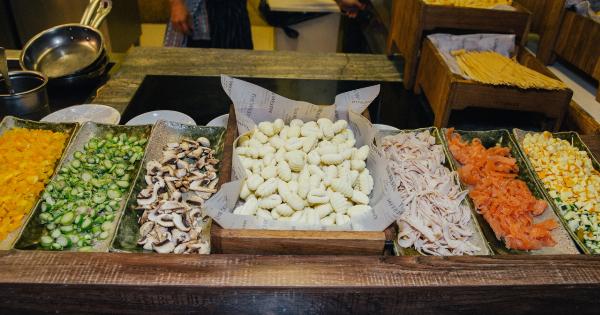Inflammation is a natural process that occurs in our body as a response to injury or infection. Inflammation is essential to our immunity and helps heal our body.
However, inflammation also has a negative impact, leading to chronic diseases such as arthritis, Type 2 diabetes, and heart disease. Poor diet and lifestyle habits can also cause inflammation in our body.
Experts suggest that consuming anti-inflammatory foods can help fight chronic inflammation and prevent the above-mentioned diseases.
These foods contain antioxidants, polyphenols, and other anti-inflammatory compounds that can reduce inflammation in our body and improve our overall health.
In this article, let’s explore some readily available anti-inflammatory foods that you can add to your diet.
1. Blueberries
Blueberries are high in antioxidants called anthocyanins, which not only provide the fruit its blue color but also help in reducing inflammation in our body. Blueberries are also high in Vitamin C and fiber.
Add them to your breakfast bowl, smoothies, or munch it as a snack.
2. Spinach
Spinach is loaded with Vitamin K, Vitamin A, and antioxidants, including flavonoids that help reduce inflammatory markers in our body. Spinach is versatile and can be added to your salads, smoothies, or cooked as a side dish.
3. Broccoli
Broccoli is a cruciferous vegetable that contains sulforaphane, a compound that has anti-inflammatory properties. Broccoli also contains Vitamin K, Vitamin C, and fiber. Add it to your stir-fries, salads, or make a broccoli soup.
4. Turmeric
Turmeric is a popular spice that has been used for medicinal purposes for centuries. Turmeric contains curcumin, which has potent anti-inflammatory effects. Add turmeric to your curries, smoothies, or make a turmeric latte.
5. Ginger
Ginger is another spice that has anti-inflammatory properties. It contains compounds called gingerols and shogaols that have been shown to reduce inflammation in our body. Ginger can be added to your teas, smoothies, or stir-fries.
6. Salmon
Salmon is an excellent source of omega-3 fatty acids, which have anti-inflammatory properties. Omega-3 fatty acids can reduce inflammation in the body by blocking the production of pro-inflammatory compounds.
Add salmon to your diet by grilling, baking, or adding it to your salads.
7. Olive Oil
Olive oil is high in oleic acid, a monounsaturated fat that has anti-inflammatory properties. Olive oil also contains polyphenols that can reduce inflammation in our body. Use olive oil as a salad dressing or cook your vegetables in it.
8. Almonds
Almonds are high in Vitamin E and magnesium, which have anti-inflammatory properties. They also contain healthy fats, fiber, and protein. Snack on almonds or add them to your smoothies, breakfast bowls, or salads.
9. Sweet Potato
Sweet Potato is high in fiber, Vitamins A, and C, and anthocyanins that have anti-inflammatory properties. They can be cooked in various ways such as roasted, mashed, or baked.
10. Tomatoes
Tomatoes are high in lycopene, which is an antioxidant that has anti-inflammatory properties. Tomatoes also contain Vitamin C and Vitamin K. Add tomatoes to your salads, sandwiches, or cook them into soups.
11. Green Tea
Green tea is loaded with polyphenols that have anti-inflammatory effects. The polyphenols in green tea have been shown to reduce inflammation and prevent chronic diseases. Drink green tea as a refreshing beverage or add it to your smoothies.
12. Garlic
Garlic contains a compound called allicin, which has anti-inflammatory properties. Garlic also enhances the immune system and can be added to your soups, sauces, or stir-fries.
13. Blackberries
Like blueberries, blackberries are high in anthocyanins that have anti-inflammatory properties. Blackberries are also high in fiber, Vitamin C, and Vitamin K. Add them to your smoothies, salads, or have them as a snack.
14. Red Grapes
Red grapes contain polyphenols that have anti-inflammatory effects. They also contain resveratrol, an antioxidant that can reduce inflammation in our body. Red grapes can be eaten as a snack or added to your salads.
15. Cinnamon
Cinnamon is a spice that has anti-inflammatory properties. Cinnamon contains cinnamaldehyde, an antioxidant that can reduce inflammation in our body. Add cinnamon to your smoothies, oatmeal, or baked goods.
16. Dark Chocolate
High-quality dark chocolate contains flavonoids that can reduce inflammation. Dark chocolate can also improve heart health and cognitive function. Eat dark chocolate as a treat or add it to your smoothies.
17. Pineapple
Pineapple contains an enzyme called bromelain that has anti-inflammatory properties. Bromelain can reduce inflammation, especially in the digestive system. Add pineapple to your smoothies, salads, or eat it as a snack.
18. Beets
Beets are high in nitrates, which can reduce inflammation and improve exercise performance. Beets are also high in fiber, folate, and manganese. Add them to your salads, soups, or roast them.
19. Carrots
Carrots are high in beta-carotene, which has antioxidant and anti-inflammatory effects. Carrots also contain fiber, Vitamin A, and potassium. Add carrots to your salads, soups, or snack on carrot sticks.
20. Oranges
Oranges are high in Vitamin C, which has anti-inflammatory effects. Vitamin C can reduce inflammatory markers in our body and improve our immune system. Eat oranges as a snack or add them to your smoothies.
21. Tart Cherry Juice
Tart Cherry Juice contains anthocyanins, which can reduce inflammation and help relieve muscle soreness. Tart Cherry Juice can also improve sleep quality. Drink Tart Cherry Juice as a refreshing beverage or add it to your smoothies.
22. Quinoa
Quinoa is high in fiber and protein and also contains anti-inflammatory compounds. Quinoa can replace rice in most dishes. Use it in salads, buddha bowls, or as a side dish with your favorite protein.
23. Lentils
Lentils are high in fiber and protein and contain anti-inflammatory compounds. Lentils can reduce the risk of developing chronic diseases. Use lentils in soups, curries, or as a side dish.
24. Avocado
Avocado is high in healthy fats, fiber, and Vitamin E, which has anti-inflammatory effects. Avocado can improve heart health and skin health. Add avocado to your salads, smoothies, or spread it on your toast.
25. Dark Leafy Greens
Dark Leafy Greens such as kale, chard, and collard greens are high in antioxidants and contain anti-inflammatory compounds. Dark Leafy Greens can be added to your salads, smoothies, or cooked as a side dish.
26. Oats
Oats are high in fiber and contain beta-glucans, which have anti-inflammatory properties. Oats can reduce the risk of developing heart disease. Use oats in your breakfast bowl or bake them into healthy treats.
27. Walnuts
Walnuts are high in healthy fats and contain anti-inflammatory compounds. Walnuts can reduce the risk of developing chronic diseases. Snack on walnuts or add them to your salads, smoothies, or baked goods.
28. Red Onions
Red Onions contain quercetin, an anti-inflammatory compound that can reduce inflammation in our body. Red Onions can be added to your salads, soups, or stir-fries.
29. Rosemary
Rosemary is an herb that has anti-inflammatory properties. Rosemary can reduce inflammation and promote brain health. Use rosemary in your cooking or add it to your teas.
30. Apple Cider Vinegar
Apple Cider Vinegar contains acetic acid, which can reduce inflammation and improve digestion. Apple Cider Vinegar can be used as a salad dressing or added to your juices or smoothies.
Conclusion
There are various anti-inflammatory foods that you can add to your diet. Incorporating anti-inflammatory foods can help reduce inflammation in our body and prevent chronic diseases.
These foods are readily available and can be easily integrated into your daily diet. If you have any dietary restrictions or allergies, consult with your healthcare professional before adding these foods into your diet.






























